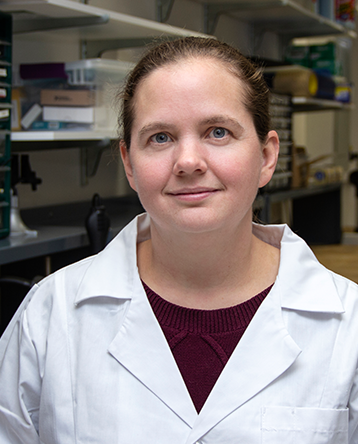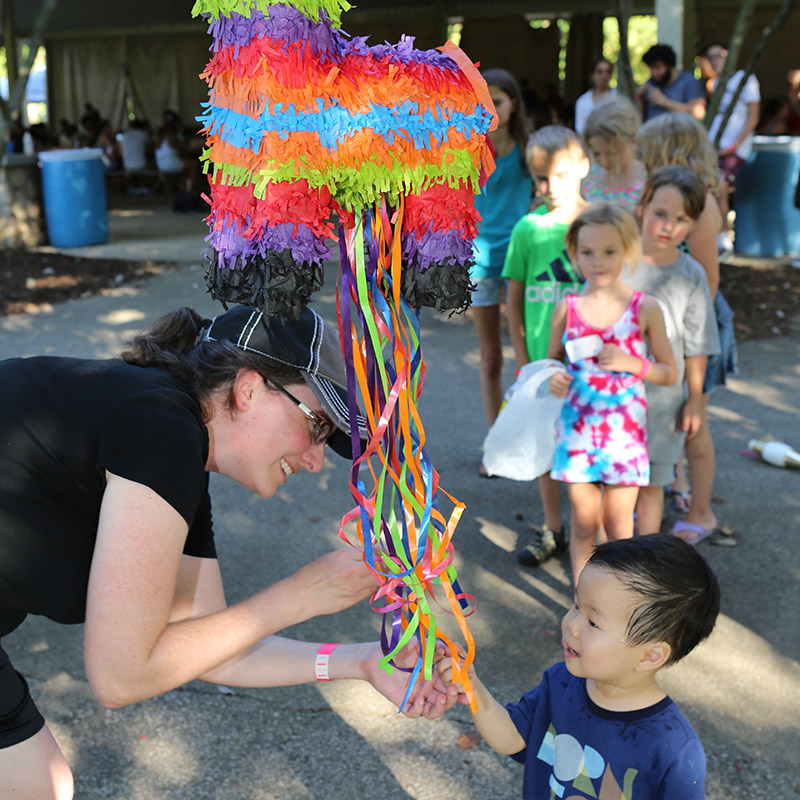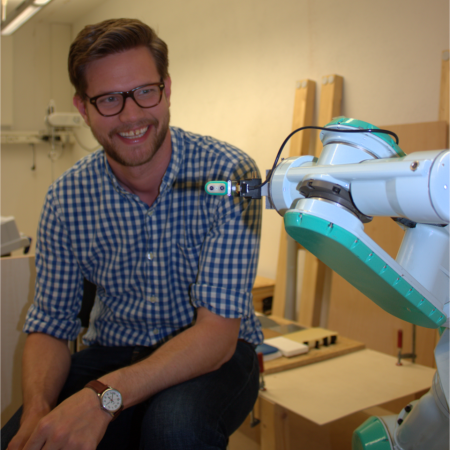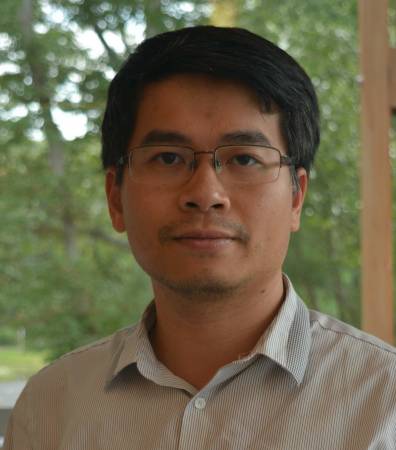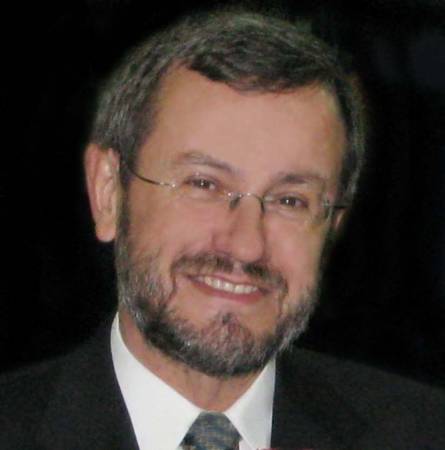Geometric Deep Learning for Perceiving and Modeling Humans
Abstract: Perceiving and modeling shape and appearance of the human body from single images is a severely under-constrained problem that not only requires large volumes of data, but also prior knowledge. In this talk I will present recent solutions on how deep learning can leverage on geometric reasoning to address tasks like 3D estimation of [...]
Carnegie Mellon University
Forecasting and Controlling Behavior by Learning from Visual Data
Abstract: Achieving a precise predictive understanding of the future is difficult, yet widely studied in the natural sciences. Significant research activity has been dedicated to building testable models of cause and effect. From a certain view, a perfect predictive model of the universe is the “holy grail”; the ultimate goal of science. If we had [...]
Human-Level Learning of Driving Primitives through Bayesian Nonparametric Statistics
Abstract: Understanding and imitating human driver behavior has benefited for autonomous driving in terms of perception, control, and decision-making. However, the complexity of multi-vehicle interaction behavior is far messier than human beings can cope with because of the limited prior knowledge and capability of dealing with high-dimensional and large-scale sequential data. In this talk, I [...]
Carnegie Mellon University
Town Hall with RI Director and RI Graduate Students
Dr. Srinivasa Narasimhan, the Interim Director of The Robotics Institute, would like to meet all of RI’s graduate students. Please join him for a Town Hall meeting at 1pm in Rashid Auditorium on Friday Aug 30!
Formalizing Teamwork in Human-Robot Interaction
Abstract: Robots out in the world today work for people but not with people. Before robots can work closely with ordinary people as part of a human-robot team in a home or office setting, robots need the ability to acquire a new mix of functional and social skills. Working with people requires a shared understanding [...]
Knowledge Transfer Graph for Deep Collaborative Learning
Abstract: In this talk I will present our latest research about knowledge transfer graph for Deep Collaborative Learning (DCL), which is a method that incorporates Knowledge Distillation and Deep Mutual Learning. DCL is represented by a directional graph where each model is represented by a node, and the propagation of knowledge from the source node to the [...]
AI in Space – From Earth Orbit to Mars and Beyond!
Abstract: Artificial Intelligence is playing an increasing role in our everyday lives and the business marketplace. This trend extends to the space sector, where AI has already shown considerable success and has the potential to revolutionize almost every aspect of space exploration. We first highlight a number of success stories of the tremendous impact of [...]
Microsystems-inspired robotics
Abstract: The ability to manufacture micro-scale sensors and actuators has inspired the robotics community for over 30 years. There have been huge success stories; MEMS inertial sensors have enabled an entire market of low-cost, small UAVs. However, the promise of ant-scale robots has largely failed. Ants can move high speeds on surfaces from picnic tables [...]
Robotics Institute Picnic
Carnegie Mellon University
Self-Supervised Learning on Mobile Robots Using Acoustics, Vibration, and Visual Models to Build Rich Semantic Terrain Maps
Abstract: Humans and robots would benefit from having rich semantic maps of the terrain in which they operate. Mobile robots equipped with sensors and perception software could build such maps as they navigate through a new environment. This information could then be used by humans or robots for better localization and path planning, as well [...]
Carnegie Mellon University
Resource-Constrained State Estimation with Multi-Modal Sensing
Abstract: Accurate and reliable state estimation is essential for safe mobile robot operation in real-world environments because ego-motion estimates are required by many critical autonomy functions such as control, planning, and mapping. Computing accurate state estimates depends on the physical characteristics of the environment, the selection of suitable sensors to capture that information, and the [...]
Robotic Grippers for Planetary Applications
Abstract: The previous generation of NASA missions to the outer solar system discovered salt water oceans on Europa and Enceladus, each with more liquid water than Earth – compelling targets to look for extraterrestrial life. Closer to home, JAXA and NASA have imaged sky-light entrances to lava tube caves on the Moon more than 100 [...]
Some New Designs of Convolutional and Recurrent Networks
Abstract: Convolutional networks (CNNs) and recurrent networks have driven the great engineering success of deep learning in recent years. However, as academics, we still wonder whether they are indeed the ultimate models of choice. Especially, CNNs seem unable to characterize predictive uncertainty, and they are highly dependent on small filters on small, rectangular neighborhoods. On [...]
Improving Multi-fingered Robot Manipulation by Unifying Learning and Planning
Abstract: Multi-fingered hands offer autonomous robots increased dexterity, versatility, and stability over simple two-fingered grippers. Naturally, this increased ability comes with increased complexity in planning and executing manipulation actions. As such, I propose combining model-based planning with learned components to improve over purely data-driven or purely-model based approaches to manipulation. This talk examines multi-fingered autonomous [...]
Language and Interaction in Minecraft
Abstract: I will discuss a research program aimed at building a Minecraft assistant, in order to facilitate the study of agents that can complete tasks specified by dialogue, and eventually, to learn from dialogue interactions. I will describe the tools and platform we have built allowing players to interact with the agents and to record those interactions, and [...]
Carnegie Mellon University
Scaling Up Deep Learning with Model and Algorithm Awareness
Abstract: In recent years, the pace of innovations in the fields of deep learning has accelerated. To cope with the sheer computational complexity of training large ML models on large datasets, researchers in the systems and ML communities have created software systems that parallelize training algorithms over multiple CPUs or GPUs (multi-device parallelism), or even [...]
Design, Modeling and Control of a Robot Bat: From Bio-inspiration to Engineering Solutions
Abstract: In this talk, I will describe our recent work building a biologically-inspired bat robot. Bats have a complex skeletal morphology, with both ball-and-socket and revolute joints that interconnect the bones and muscles to create a musculoskeletal system with over 40 degrees of freedom, some of which are passive. Replicating this biological system in a [...]
Attentive Human Action Recognition
Abstract: Enabling computers to recognize human actions in video has the potential to revolutionize many areas that benefit society such as clinical diagnosis, human-computer interaction, and social robotics. Human action recognition, however, is tremendously challenging for computers due to the subtlety of human actions and the complexity of video data. Critical to the success of [...]
Carnegie Mellon University
Underwater Localization and Mapping with Imaging Sonar
Abstract: Acoustic imaging sonars have been used for a variety of tasks intended to increase the autonomous capabilities of underwater vehicles. Among the most critical tasks of any autonomous vehicle are localization and mapping, which are the focus of this work. The difficulties presented by the imaging sonar sensor have led many previous attempts at [...]
Deep Learning for Robotics
Abstract: Programming robots remains notoriously difficult. Equipping robots with the ability to learn would by-pass the need for what otherwise often ends up being time-consuming task specific programming. This talk will describe recent progress in deep reinforcement learning (robots learning through their own trial and error), in apprenticeship learning (robots learning from observing people), and [...]
Temporal Modeling and Data Synthesis for Visual Understanding
Abstract: In this talk, I will present two recent pieces of work on leveraging temporal information and synthetic data to enhance video and image understanding. In the first part, I will introduce a progressive learning framework, Spatio-TEmporalProgressive (STEP), for action detection in videos. STEP is able to more effectively make use of longer temporal information, [...]
Multiple Drone Vision and Cinematography
Abstract: The aim of drone cinematography is to develop innovative intelligent single- and multiple-drone platforms for media production to cover outdoor events (e.g., sports) that are typically distributed over large expanses, ranging, for example, from a stadium to an entire city. The drone or drone team, to be managed by the production director and his/her [...]
Modeling, Design, and Analysis for Intelligent Vehicles: Intersection Management, Security-Aware Design, and Automotive Design Automation
Abstract: Advanced Driver Assistance Systems (ADAS), autonomous functions, and connected applications bring a revolution to automotive systems and software. In this talk, several research topics in the domain of automotive systems and software will be introduced: (1) graph-based modeling, scheduling, and verification for intersection management, (2) security-aware design and analysis considering timing, game theory, and [...]







